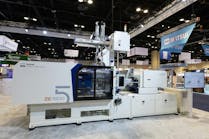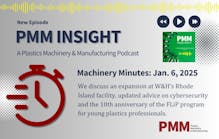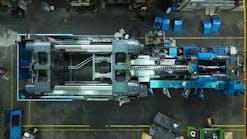By Karen Hanna
The three-letter prefix in Rick von Kraus’ last name captures a history punctuated by a battle in what is now Serbia and the Addex Inc. co-owner’s decision centuries later to leave Eastern Europe.
Finding out what’s packed into that little word — a traditional marker of nobility — consumed part of von Kraus’ life as he transitioned from active leadership of Addex to his current role, as president of the board of directors for the company, which designs equipment for blown film extrusion lines.
In a recent interview with Senior Staff Reporter Karen Hanna, von Kraus reflected on Addex’s record of innovation — including the Short Stack, the latest update of its Intensive Cooling ring, which debuts at the K show —as well as the history of Transylvania, the land of his ancestors.
You’re originally from Romania. How did you land in the U.S.?
von Kraus: I lived in Romania, which was Communist at the time. I worked at the American Embassy. I helped U.S. businessmen do business [in Romania], a country whose rules they really didn’t quite know or didn’t understand, because everything was owned by the government.
Most Communist countries were pretty restrictive. I had already two brothers in Germany; one had left illegally, the other one legally. So, I knew the West is a better place to live than Communist Romania. I’d worked as a tourist guide while I was a college student at the Black Sea, where a lot of foreign tourists came to spend their holiday. So I realized they have a certain freedom that we don’t have in Romania. My wife was even more determined to leave than I was. That pretty much was the start of thinking, “We better get out of here because there is no future in this country, unless you become a Communist Party member and become like I would say more than 70 percent them were — hypocrites, meaning they sang that song but didn’t believe in it.” It didn’t feel that is the way to go.
Working at the American Embassy was seen as a good job because it was paying basically twice as much as the people that finished college with me got at the time. But money alone doesn’t do it for anybody, I guess, in the long run.
In our effort to gain permission to leave the country we wrote to many people: Kurt Waldheim, UN Secretary-General at the time; the Pope; Sen. Henry Martin "Scoop" Jackson (D-Wa.); Congressman [Charles] Vanik (D-Ohio), Romanian President Nicolae Ceausescu — the only one who did not respond — and, of course, President Gerald Ford.
One of the trade mission participants was a gentleman named David P. Box whose father had started a business, called Tedruth Plastics in Farmingdale, N.J., making plastic things in the United States.
I told him that my wife and I would like to leave, and David became our sponsor.
I came to the States, and I looked for a job. He had offered me a job, but I was not interested in plastics because I had no experience in plastics and got offered [a job] from PepsiCo to become their guy for Eastern Europe.
How did you wind up in plastics?
von Kraus: I left Romania with a stateless passport, meaning I was a citizen of nobody.
[Coming to the U.S. as] stateless [people] was our choice. The American Embassy in Bucharest, said, “Don’t give up your Romanian citizenship because it will be easier for you if you keep that citizenship, although you are overseas.” But we said, “No, we don’t want to have anything to do with a Communist country anymore,” and gave it up. And that was a mistake. Because Roxana, my wife, could have worked. She was a translator in Romania, and she could have gotten a job at the UN in New York and couldn’t because of her stateless passport.
PepsiCo offered me a salary of $20,000. In ’76, when this happened, that was not a bad offer. However, their legal department checked on my passport and realized I would have a tough time getting visas to go to various countries.
When that fell apart, I ended up working for David, and he became the president of that plastic company and he was in injection molding. Then he got into blown film and bought two Alpine lines.
What were those early days in the States like?
von Kraus: We started in New Jersey. My friend’s business was in Farmingdale, N.J.
We rented an apartment in Asbury Park, very close to the boardwalk, which today is a fun city to be in. At the time, it was pretty rundown. But we could afford it, and it was by the sea, so it was nice.
Then the company was sold to Cities Service Co.
I got my MBA and moved pretty quickly up the corporate ladder, and they decided to sell themselves to Occidental Petroleum, which didn’t want anything to do with plastics.
That’s when I joined Windmoeller & Hoelscher (W&H) Corp. (in 1983) in Lincoln, R.I., which was looking for a sales manager for the extrusion equipment. Roxana, [who was] born and raised in Bucharest, did not want to live in provincial Providence, and we purchased a home in the most southern part of Boston.
How did Addex come about?
von Kraus: At W&H, I was making 60-some-thousand a year, and Alpine offered me the vice presidency for $75,000, something you couldn’t turn down.
[But] I didn’t get along too well with the owner of Alpine. And, although I had a five-year contract, he asked me two and a half years into it [to leave]. And I said, “Yep, no problem with that, I will not stick with a five-year [contract]. I’m not interested to stay in a job I don’t necessarily enjoy.”
He left me the [company] Mercedes and $50,000, and I was free to go.
I had already an offer at the time, from Duro Bag Manufacturing Co., at the biggest paper bag company in the U.S., and they wanted to get into plastics. They offered me the job of vice president of plastics, meaning I had to start the plastics business at Duro Bag. And that involved purchasing equipment, running the place, running the production, all that. But Roxana and I looked at Cincinnati because they were in Northern Kentucky, and we looked at places to stay in Cincinnati and we just couldn’t give up Boston, so I stayed only one year. I commuted every week, and I think I had a flight at 6:30 or seven o’clock in the morning to Cincinnati and Fridays back, for a whole year.
I was looking for another opportunity and got involved as an independent guy with Polysystem [Machinery MFG], owned by two former Brampton Engineering guys, Ricardo Rodriguez and Alfredo Bentivoglio. I [was] responsible for sales in the U.S.
They sold their company to a group of investors. Ricardo, the technical guy of the two owners, [and I] talked about starting a company. I decided on the name: Addex. We want it to be always among the first listed on any magazine, and then I wanted it to sound positive. So “add” is a positive addition; it’s a positive word, and then of course, extrusion — “ex.”
Ricardo had been a big supplier to Mobil Chemical Co., which at the time was the largest film producer in the world. In Mobil’s R&D division were some smart people, including Mr. Robert Cree. He wanted to get away from Mobil because he was slated for higher management at Mobil; he wanted to stay with his hands in the sand, doing things rather than telling other people what to do. I told him, “Bob, I can’t pay you. We don’t have the money. You have to come up with a product that we can sell, then you live from that.”
And sure enough, he had developed for Mobil a touch-free internal bubble cooling [technology], meaning cooling also inside the bubble rather than only outside the bubble. He went to his boss at Mobil and said, “I developed this for Mobil, but you guys don’t want to do more with it. I have an idea of making it even better. Would you mind if I do that on my own?” They said, “No, go ahead.” Mobil didn’t license anything.
I started to sell the internal bubble cooling system, and we sold a lot of them. And Bob had an income [from sales], so he paid for himself.
How has Addex evolved?
von Kraus: We were three guys in 1989, 1990, when we started. And seven years later, Ricardo left, so we had a little crisis, but Bob and I are still today 50-50 owners of Addex, and everything went well, eventually.
The first product that Bob and Ricardo designed together was the oscillating haul-off. I contributed to it with the idea because W&H had developed an oscillating haul-off, which was not very popular at the time.
Then, Bob decided to make complete lines. Bob and I sold a few of them. And in the early 2000s — it might have been during the crisis of 2008-2009, or maybe even before — we lost money on all our complete lines because we had to develop everything from scratch, and had to compete [with] people that already had the final designs finished. So, the lines we sold were all at heavy losses.
Although we had all the components developed on our own, it cost us millions of dollars, so, we said, “The hell with it, we’ll go only with what we do best, and that is cooling, gauge-control and everything related to that.”
Particularly the financial crisis, it scared us.
The bank we did business with was acquired by Santander, a Spanish bank, and they started to claim all these things in the contract that we didn’t even know are in the contract. They made it tough for us. We decided, “We can’t continue like this, relying on banks to help us pay our bills and all that stuff.”
That’s when we decided, “This is not our future.” Today we are debt free, have paid all our bills.
How do you view the company’s outlook now?
von Kraus: The best choice we made was when we got out of the complete line business because that has become a cutthroat business. People that paid into the complete line business, unless they were the Europeans with the entire world as their market, just [having] the U.S. market made it tough for a company.
Having today only the cooling and gauge-control and all those related products made us very successful. And we don’t have to pay all that R&D money to develop heavy equipment, like winders that cost us probably close to $700,000, $800,000, and we didn’t get anything in return. Well, we sold two of them, three of them, four of them, whatever, but the return was not there to pay back those investments.
Addex has always been an independent company, not part of any conglomerate. It tries new things, pushing the envelope in technology and inventions. From the oscillating haul-off to the IBC control, it was always ahead of the game, and that is the future. We can’t, we will not give that up.
How many employees do you have right now?
von Kraus: Not many. We subcontract all the manufacturing. I remember the first outfit in our business that did that — no manufacturing, everything was outsourced — was Frank Nissel with Welex. I visited him once in Pennsylvania. I looked around and said, “Where are your machine tools? How do you make all this?” He told me, “I’m subcontracting everything.” That was the first time that I realized that it works because you don’t want to do something where you don’t know exactly what the outcome will be.
In the past decade or so, you returned to school. Why?
von Kraus: I loved history in school. History and geography were the two [subjects] — and sports — I preferred.
I’ve always read history books. I realized that [Cree] will take over and I will have more time on my hands, I decided to take history courses.
In 2016, I gave the presidency over to [Cree] and I started already in 2012 to take history courses at Harvard. The first one was about the Yalta Conference, and my first teacher basically wrote the best history of Ukraine. Before we ended the course, I said, “Professor, I don’t know, this is tough for me. I don’t know whether I should continue at all.” And he wrote me a scathing letter that said, “What are you talking about? You are my best student.” Which was a shock to me, and that gave me the push to finish and get my master’s. I had him two or three more courses, and became friends with him.
I had a course with Charles Maier. I think it was the two world wars. I liked that course, and he decided to become my thesis director. So, strange things happen in that whole process. I did my research and came up with a theme and went back and forth. I basically wrote three theses before I had the right one.
I define his style of teaching: Allow students to fail in order to succeed. Because I wrote two full drafts, 150 pages, whatever they are, before I wrote the right one, and the right one, the last one, which was published in German and Romanian, is the story of my family. In 1702, my ancestor, Thomas, became ennobled for his behavior in a battle against the Ottomans.
The battle happened in 1697. And five years later, he was ennobled by Leopold I, of Habsburg.
Transylvania, where all this happened, today is part of Romania. It used to be part of Hungary first, and then part of the Habsburg Empire. After the First World War, it became part of Romania.
We always were a minority, the Germans there. They came in the 11th and 12th century from German-speaking places, including Holland, with certain customs and habits that they carried on in this new environment, all the way to Transylvania to find a better life, pretty much like the Puritans here in the States.
They enjoyed that freedom, not having any feudal obligations to one of the Hungarian feudal orders, so they responded directly to the king, and had their own judicial system.
This 850-year history made them pretty independent people. And when Communists took over, it was like going backwards. It was completely against their way of life. They started to leave to Germany, in the ’60s already.
Many of them left even before the Communists fell. But after that, when they were free to leave, almost all of them left. There are only about 10,000 [people of German heritage] in Romania today.
I’m one of the few that came to the States.
What was going back to school like?
von Kraus: I enjoyed every moment of it. In many of the courses, I was the oldest one. I think a gift at older ages is being self-deprecating, making fun of yourself, and then you can basically fit into any group, whether they are 30 years younger, 10 years younger, 15 years younger. And I had no problem.
I have three degrees. This was the toughest one, so Harvard deserves the esteem that it gets because it is tough, but in a very helping way. If you don’t understand something, you don’t have to hide it and say, “Hey, I’m stupid.” No, you can go to the teacher, and he helps you. There is nobody that regards you as stupid. Although there must be some stupid people in this world, but Harvard doesn’t tell you that.
That’s how you learn new things. If you always give the impression that you know it all, nobody comes by and tells you new stuff because they assume you know it all.
Now that your thesis is done, how do you spend your spare time?
von Kraus: I run five miles every day. Before I do the last mile, I go into the ocean and swim for about 10-15 minutes, and then I go finish my run. I did it even while I was still working, but I had to do it like at 7 o’clock in the morning, and that’s pretty unpleasant. So [now] I do it around 9, 10, even 11 o’clock.
I also work on a biography of Nicolae Malaxa, a pretty famous Romanian industrialist between the two world wars, who ended up in the States. Because he worked with the king, Carol II, who was a dictator, he worked with Nazis that were active in Romania. As a businessman, he had to deal with all these people. He couldn’t have stayed in business if he didn’t deal with everybody who had the power. And then he also dealt with Communists. And sure enough, coming to the States, he was accused of being a Nazi, a Communist, of all the negatives. The CIA, FBI and Department of State had a field day with this poor guy. I concentrate on all this stuff, because these are declassified materials from all these U.S. government agencies, and it’s thousands of pages.
With Carol II, he had to be corrupt, and he was corrupt. But even today, Romania struggles with corruption, like most Eastern European countries. For you to survive, you have to be corrupt.
But then the poor guy comes to the States where corruption is not necessarily appreciated. He ends up contributing to Nixon before he became president; he helped him when he wanted to become governor of California, congressman. But then he died in 19[65], before Nixon became president, or vice president.
Eventually, I might write something about plastic history, maybe Addex, or maybe more than just Addex, I’m thinking of that.
Just the facts
WHO IS HE: Rick von Kraus, chairman of the board of directors for Addex Inc., Newark, N.Y.
AGE: 73
EDUCATION: Master of Arts, philology, Universitatea din București, 1972; Master of Business Administration, industrial marketing and international business, Rutgers University, 1981; Master of Arts, history, Harvard University, 2017
MASTER’S THESIS: “Artisans and Nobles: The von Kraus Family across 350 Years of War and Social Change in Eastern European History”
Karen Hanna | Senior Staff Reporter
Senior Staff Reporter Karen Hanna covers injection molding, molds and tooling, processors, workforce and other topics, and writes features including In Other Words and Problem Solved for Plastics Machinery & Manufacturing, Plastics Recycling and The Journal of Blow Molding. She has more than 15 years of experience in daily and magazine journalism.






